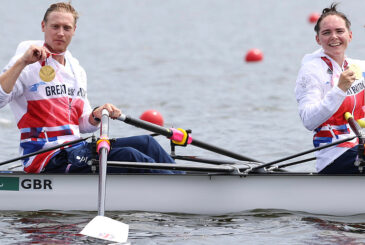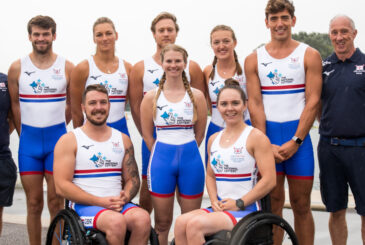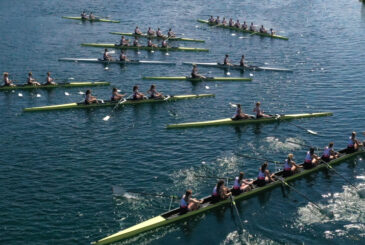Canadian Olympic rower Caileigh Filmer helped qualify the pair and eight boats for Tokyo, but has recently been recovering from a serious bike crash and has also overcome depression. Martin Cross catches up with her to find out more
I had thought my conversation with Caileigh Filmer was going to be mostly about her rowing. Given her palmarès, I guess that was a fair assumption. Not only had this open, engaging and tough woman stroked the Canadian eight in Rio at the tender age of 19, but a couple of years later she and her partner Hillary Janssens blasted apart the world’s best women’s pairs apart to win the 2018 World Rowing Championships and set themselves up as potential favourites for Olympic gold.
They followed that up with a bronze in the pair in Linz the next year and both women doubled up to help the Canadian eight qualify for Tokyo. But we didn’t get round to Caileigh’s rowing achievements until the last part of our conversation.

What we focused on was more about fate and life and how, oftentimes, they intervene to put us in situations that we might never had imagined we’d experience.
When we spoke, Caileigh was just a few weeks out from a serious bike crash. The fact it could have ended up far worse than it did was a sobering thought.
Her collarbone, broken in four places, was operated on, and is now held together by a metal plate and six screws. Three and a half months on, she took her first row back on the water in January.
“Her experience of depression and recovery is something that she is determined to be open about to help others”
What happened to Caileigh in that accident and during her recovery is a whole story in itself. I imagined that it would have probably been the toughest challenge this 23-year-old had faced. But it turned out I was wrong.
In 2019, with the racing season just about to start, Caileigh had spent three months suffering from depression. During this time, she was unable to look after herself, let alone row. Yet, amazingly, she recovered in time to make the World Championships on just a few weeks’ training.
Her experience of depression and recovery is something that she is determined to be open about, chiefly to help others who might experience something similar. Caileigh’s story – before you even get to the rowing – is inspirational.
I asked her first about her bike accident.
“I rotated into the air and landed on my shoulder, barely missing slamming into a tree”
Martin: What do you remember about the crash?
Caileigh: I was going down a descent on a single lane road that was just wide enough for two cars to go through. I came around a corner and there was a car that was pretty far over, so I slammed on my brakes and tried to manoeuvre off the road. There was a lot of debris on the side of the road, and because I was going pretty quickly, my bike started sliding out from under me. I rotated into the air and landed on my shoulder, barely missing slamming into a tree. It was just bad timing and a freak accident. Thankfully the only thing that was injured was my collarbone.
What happened afterwards?
On the way to the hospital, I was in an excruciating amount of pain. All I had taken was some Tylenol. I told them that I get tested by WADA and I have to be careful about what I take. Then the X-ray results came back, and the nurse told me that I’d need something much stronger than Tylenol.
She showed me the picture of my collarbone, which was completely shattered and displaced. I broke down and sobbed my eyes out for about an hour. I was fortunate to get an incredible surgeon to operate on me. The job he did took a month or two off my recovery time.
How have you been since then?
Right now, it’s hard to think about rowing, so I avoid going to the boathouse. I had trouble sleeping because I was having a lot of symptoms of PTSD [post-traumatic stress disorder].
On a scale of 1-10, the pain is now about a 2. The range of motion in my arm has been improving a lot. I am fortunate that I am able to use the bike trainer, and our physiologist has given me a training programme that will make sure I’m extremely fit when I do come out of this.
I was blown away by the support I’ve received. My partner Hillary has been amazing, as has my coach Phil Marshall. Our dietician has helped me with a diet that supports bone growth and healing. I also get support from a physiotherapist, a counsellor and sports psychologist.
Is this the most challenging thing you’ve had to face so far?
I would say injury-wise, physically yes.
I missed the entire 2019 World Cup season due to depression, and that was the longest I’d been away from rowing. It came on towards the end of March and I didn’t get back in the boat until July.
There were a lot of personal things that built up slowly, and combined with some injuries, it was like one thing after another, and eventually I broke a bit.
I’m pretty stubborn and don’t like to ask for help too much. Going through that experience has definitely taught me that I need to communicate better.
“I still remember the day that I finally began feeling like myself after months of cognitive behavioural therapy”
What were your experiences?
It was the hardest thing I’ve ever been through for sure. I found it hard to get out of bed in the mornings. Dave [Thompson, my coach] was such a rock for me. He knew that I’d been struggling for a while. He said: ‘I’m here for you. I don’t care if you don’t take another stroke in the boat.’
At first, I thought that all I needed to do was get to practice and that would be an escape from what I was dealing with. When it stopped being an escape and it was hard to just get to practice, that’s when I knew something was really wrong. There was one practice that I just cried all the way through, but I had these sunglasses on so nobody knew. I had to move back in with my parents because I couldn’t take care of myself.
You began to come out of things towards July?
I still remember the day that I finally began feeling like myself after months of cognitive behavioural therapy. It was like I had been given the toolbox I needed to be able to cope with stresses.
When I was finally allowed to get back in the boat, my sister came over to visit. We went to get some ice cream, and we were sitting in the back of my parents’ car. I had my Dad’s goofy hat on, and I was taking some funny selfies. We got home and I was sitting there, laughing at the pictures on my mom’s phone. I looked up and noticed that both my parents had started crying. I asked them why they were crying, and they said, ‘This is the first time we’ve seen happy Caileigh’.
It was a really special moment and that was when it really sunk in that I had gotten myself back. Afterwards I’ve had people reach out to me to ask me how I got through it. I’ve never shied away from being open about it. If I can help someone going through something similar, then that sits well with me.
“I just had such a fire under me, and it was just inspiring”
So, getting a result in the pair seems like a minor miracle…
When I got back in the boat, I was so determined to be there because rowing had been taken away from me. Every practice was 110%. I definitely put a bit too much pressure on myself. I would just go into ‘Terminator mode’ – as my counsellor called it – and be absolutely relentless and fearless. I just had such a fire under me, and it was just inspiring.
In addition to being in the pair, Dave put us in the eight in order to give it the best chance of qualifying.
What about the World Championships?
Throughout the regatta, I felt the pressure of doubling up, because it was such a big task, but I was confident in my abilities.
I had an idea of where we would stand in the pair, but in the eight, the field was so tight, and the thought of not qualifying was terrifying.
After our bronze in the pairs race, I couldn’t stop crying. I was so emotionally exhausted and overwhelmed.
The next day, we helped qualify the eight, and that was a huge relief. The whole regatta taught me and Hillary that we can get through anything. It also reminded us of how much fun we have rowing the pair together.
It must have felt different from the year you won the World Championships?
That year we had phenomenal speed going into the regatta. We’d beaten the World Champions from New Zealand in the semi, so we knew we could beat them again. In the final, we executed every call really well, and we had confidence throughout the whole race that we could win.
After the race, Hillary and I cried into our moms’ arms. My mom had just found out she could fly to Plovdiv after having cancer treatment. I was so inspired by her, and to have her there meant the world to me.
So, what about the Tokyo Olympics?
When COVID hit, it was really hard on both of us. We had been through some really tough blocks of training; we were technically rowing at the best level we had achieved. So, I found it incredibly disappointing initially, knowing that the Olympics weren’t going to happen. It took me quite a while to process it.
After my accident my focus is on recovery, so I can get back in the boat again.
Photos: Merijn Soeters / Rowing Canada










